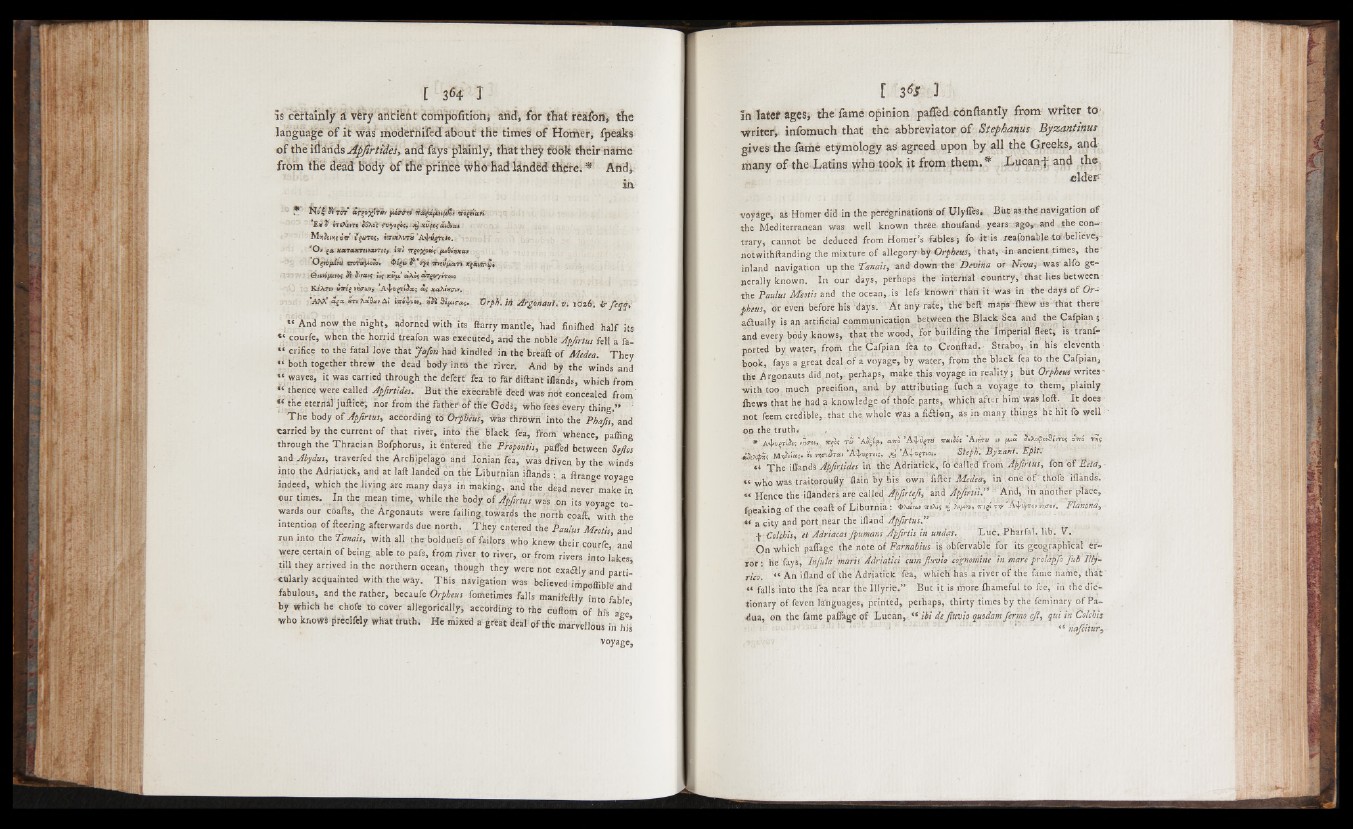
is certainly i. vèry aritifent coiUpofitionj àlidi for that reaiori, the
language o f it was modefiiifecf about' tHfc times o f Homer, fpeàks
o f the i(lands Afifi'rtides, and ftys plainly, that thëÿ foòk their name
from thë dèad Body o f the p'rihcë WBô Had làndëd' there; * Arid*.
in
- * J i -roT a ^ o ^ i r u y p ib b e i t e e ^ p tp t ip i c v ô ç iia r i
Ea?a ÌtsAÌito iéhoç fvytfa, XjXVftç atSrut
MjjJìhjj ¿v içutoç, irnxXvTb ‘A'Ï'Vçtcto.
O» ça xartutTMantÇf ivi vçoxpùç puQsuxup
Oçttopurû «rorwjàoJbw 9 é çit o "ó'jeè v r s v fu n i x çà t fà ii»
QsitôftÆtoç Si Saetti itf vvjjL «Acç ctTçvyhoto
îg Kttersr vvtç trieur, At)/t>çTiSetç ¿s xaXiaetr.
'Àrt-âfmmtJtmtS ¡ffi'Ki, SU Stenta Vrpfr. iA Argonaut, v. îbîfi’. & f i i j i
.« And now the night, adorned with its ftarry mantle, had finiihed half its
« courfe, when the horrid treafon was executed, and the nhbitApfirtus fell a fa-
? crific? 10 the fata) Iove that J “f i ” had kindled in the bread o f Medea. They
“ both together threw the dead body into the river. And by the winds and
« waves, it was carried through the deferf fta to far diflant ¡(lands, which from
“ thence were called Apjirtides. But thé exécrable deed Was not concealed from
“ ,he eternàì juftice; nor from thè ftthèr of the Gdd3; who fees every thing.”
T h e body o f Apfirtus, according to'OrpfteUi, Was thrown into the Phafis, and
carried by the current of that rivét, inio the Black fea, from whence, paffing
through the Thracian Bofphorus, it entered the Pripontis, pàfléd between Sefios
and Abydus, traverfed the Arclìipeldgó and Ionian fed, was driven by the winds
ipto the Adriatick, and at laft landed' ¿h the Liburhian iàaridd : a ftrange voyage
indeed, which the living are many dayd in making, and thé d«d never make in
our times. In the mean time, while the body of Apfiriui was on its voyage towards
our còaiìs, the Argonauts were failing, towards the north coait, with the
intention of fleering afterwards due north, ; They entèred the Paulus Meotis, and
run into the Tanais, with all th t bo'ldnefs of failors who knew their courfe,' and
Were certain of being able to pafs, from river to river, or from rivers into lakes*
till they arrived in the northern ocean, though they were not exaflly and particularly
acquainted with the way. This navigation was believed iriipdflibje and
fabulous, and the rather, becaufe Orpheus fometimès falls manifeftly into fable
by which he chofe to cover allegorically, according to the cuftom of hid age*
who knows prccilciy What forth. He thiXed a grtat deal of tlie marvellous iti his
noyage,
in latef ages* the fame opinion pafled cónftantly from writer to
■writer, infomuch that the abbreviator o f Stephanus Byzantinus
gives the iame etymology as agreed upon by all the Greeks, and
many o f the Latins who took it from them. * Lucan-f- and the.
«Idei5
voyage, as Homer did in the peregrinations o f UJyffcs. B u t as the navigation of
the Mediterranean was' well known three thoufand years: ago,- and the contrary,
cannot be deduced from Homer’s fables j io i f is reafonable toi-believe*-
notwithftanding the mixture of allegory by-Orpheus, that, in: ancient times, the
inland navigation up the Tanais, and down the Devina or Nevai - was- aliò generally
known. In our days, pertiaps the iht'érrfïl country,'that lies between
the Paulus Metis and the ocean,.is le ft known- tha’ri it Was irt the days o f Orpheus,
dr even before his days. At any rate, thè bed maps (hew us that there
aâually is an artificial communication .between the Black^Sea and the Çafpian ; ■
and every bódy .knows, that the wood, for buiiAin^ the Imperial fleet* is tranf-
ported by water, from the tàfpian fëà to Cronftad.- Strabo,-in his eleventh
book, fays a great deal of a voyage, by water, from the black iea tb the Caipian,
the Argonauts did not,, perhaps, make this voyage in reality; but Orpheus writes-
with too. much precifion, and by attributing fuch a voyage ..to them, plainly
fhews that he had à knowledge of thole parts, which aÿter him; was loff. It does
not feem credible,. that thè whoie Was a fiâi«n, às in many things' he hit fo well
on the truth, i , , L ^ .. & iu
*'A+«p(Jks neoiXj Uftf T" ’a$gfp, aerò ’Ai/vjra eratSii 'Aiita i, pt* MoporSirnf v i r i n t
¿kxpvi «1 Sis ph. Bfrant. Epit.
<t The iliands Apjirtides in thV Adriatick, fo called from Apfirtus, fon of Eèfd,
“ who was traitoroufly (lain by his own."fitter Medea; Infi one ò f ' thòle i(lands.
« Hence the iflànders.are called ÀJfirtefi, aiid Apfirtii.” And, in another pfece,
fpeaking of the coaft of Liburnià : «-»xif ’’"fi ■'*’ ¿Afeÿeyimi. Ftanona
8 a city and port near the ¡(land Apfirtus'’ ,
f Colchis, et Adriacasfipumans Apfitrtis in undas. Luc. PharfaL lib. V.
On which pafiage the note of Farnabius Is bbfervable for its geographical error
: he fays, Infiula marts Adriatici çtàn'jfùm»H H in mare fhtapfl Jui lily-
rico. “ An ifland ofthe Adfiaiick le a , which' has.a river of the tame name, tfia f
“ falls into the féa near the Iltyrifc.” But it is ifiore fliameful to fee,’ in the dictionary
of feven languages, printed, perhaps, thirty times by the fennnary of Padua,
on the fame pa finge of Lucan,.“ ibi de pluvio juodam fiermo eji, qui in Colchis
icui ani tv - ■■ * ■ . " ■ jjafiitur*